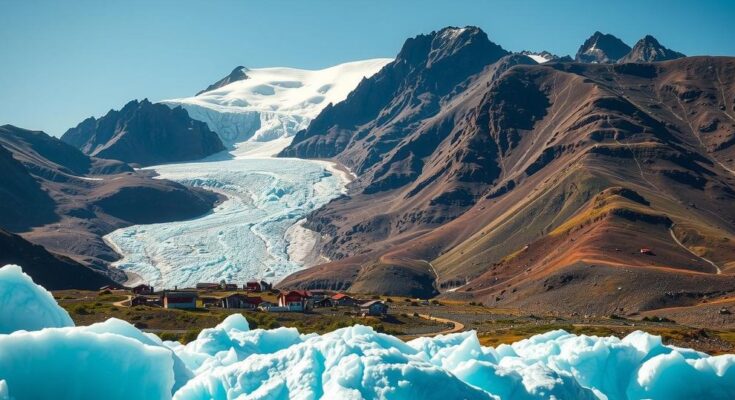The Rwenzori glacier in Uganda is melting rapidly, threatening local communities reliant on its water supply. Collaborative efforts between scientists and citizen volunteers seek to mitigate flooding risks and understand environmental changes. Despite the glacier’s decline, traditional knowledge and agroforestry practices are being revived to promote ecological sustainability for the future of the region.
A glacier located atop the Rwenzori mountains in Uganda poses a significant threat to local villages as it melts rapidly due to climate change. Scientists like Dr. John Sekajugo and Professor Matthieu Kervyn are collaborating with local communities to monitor water flows and predict floods, which have increased in frequency and intensity since 2013. Sylvester Walyuba, a caretaker of a sacred water source, notes a changing pattern, with floods now occurring multiple times a year, raising alarms about the impact on safety and infrastructure.
The Rwenzori mountains, boasting a summit of 5,109 meters, are home to one of Africa’s last glaciers, which is expected to disappear by 2030. A recent seven-day hiking expedition revealed that the remnant ice cover has diminished significantly from the 7.5 square kilometers documented by early explorers. This glacial melt threatens the regional water supply, crucial for agriculture and livestock for millions of residents, as foundational rivers like the Semuliki depend on this vital resource.
Dr. Hilde Eggermont from the Flemish Research Institute for Nature and Forest explains that the loss of glaciers disrupts essential hydrological cycles, increasing vulnerability to extreme weather events. Communities are also affected by exacerbating factors such as deforestation and intensive agriculture, leading to increased landslides and flooding risks. Farmer Zephanas Masereka recounts the devastating impact of landslides on his neighbor’s home and livelihood, highlighting the economic burden of such natural disasters.
The Rwenzori mountains are culturally significant for the Bakonzo and Batoro ethnic groups, serving as both a home and a revered source of wisdom. Anthropologist Dr. Bosco Bwambale emphasizes traditional practices that foster harmony with the environment, which have been undermined by modern actions like mining and agriculture. Strategies based on indigenous knowledge advocate for ecosystem preservation, respecting sacred sites while enhancing agricultural resilience through improved land management.
Efforts to restore this connection to nature are underway, led by organizations such as the Natural Resources Defense Initiatives, which focuses on agroforestry and indigenous tree planting. These initiatives aim to slow erosion and stabilize riverbanks, contributing to ecological balance. Community members like Kezia Bunehezi have adopted sustainable practices that improve soil health amidst changing climatic conditions. As the glaciers continue to retreat, the survival of local ecosystems and cultural heritage hangs in the balance, necessitating a revival of ancient traditions for future sustainability.
The melting of glaciers in the Rwenzori mountains represents both an ecological and cultural crisis, as local communities face increased flooding and diminished water resources. The collaboration between scientists and citizens to monitor environmental changes underscores the importance of integrating traditional ecologically sustainable practices. By rekindling indigenous knowledge and promoting agroforestry, these communities aim to preserve their way of life and adapt to changing environmental conditions. Ultimately, the future of the region hinges on the revival of ancient practices alongside modern scientific approaches to manage an increasingly fragile ecosystem.
Original Source: www.telegraph.co.uk




